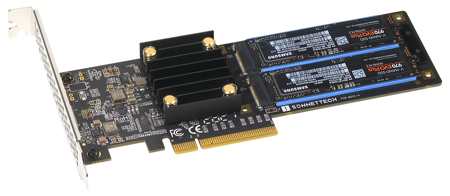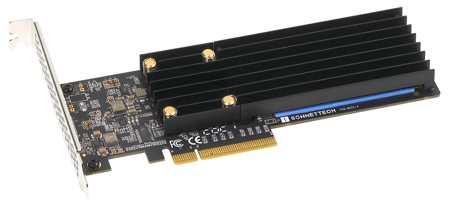Sonnet M.2 2×4 Low-Profile PCIe 3.0 Adapter Card Featuring 2 NVMe SSD Slots 16-Lane PCIe Bridge
$200 (SSD less)
This is a Press Release edited by StorageNewsletter.com on June 27, 2022 at 2:01 pmSonnet Technologies, Inc. announced the M.2 2×4 Low-Profile PCIe Card, added to its family of performance storage adapter cards that enable the installation of multiple SSDs into a computer’s or Thunderbolt expansion system’s PCIe card slot.
M.2 2×4 Low-Profile PCIe Card no heatsink
 The low-profile, half-length PCIe 3.0 card features 2 M-keyed NVMe M.2 SSD slots that support the installation of M.2 form factor NVMe PCIe SSDs.
The low-profile, half-length PCIe 3.0 card features 2 M-keyed NVMe M.2 SSD slots that support the installation of M.2 form factor NVMe PCIe SSDs.
What it does?
The M.2 2×4 Low-Profile PCIe Card enables users to mount 2 M.2 NVMe 2280 PCIe SSDs (sold separately) into almost any expansion card space with an available x8 or x16 PCIe card slot, up to 16TB of storage capacity (with today’s highest-capacity SSDs) may be installed. RAID-0, RAID-1, and JBOD configurations are supported, providing users with flexibility in configuring the SSDs for performance or data safety, or both.
Why it’s important?
For users who need to add internal storage to their computer and require high-speed data transfer speeds for a smooth workflow – such as video editors working with 6K and greater resolution footage – an NVMe M.2 SSD-based upgrade is ideal. Many computers do not include slots to support installing M.2 SSDs directly but do include PCIe expansion card slots. With the M.2 2×4 Low-Profile PCIe Card installed, a user can mount two SSDs in a single PCIe slot – with no cables, adapters, or mounting trays required – for instant-access media storage or as a high-performance scratch disk. For users whose computers lack PCIe card slots – such as notebooks, mini, and all-in-one desktops – but include Thunderbolt ports, installing the card into one of the company’s multi-slot Echo Thunderbolt to PCIe card expansion systems connects the M.2 2×4 card’s dual SSD slots through a single cable.
How it’s distinctive?
Compatible with macOS, Windows, and Linux OS, theM.2 2×4 Low-Profile PCIe Card requires a low-profile card space and includes both full-height and low-profile PCIe brackets – so it is for use in most any desktop tower, mini workstation or server computer, or Thunderbolt to PCIe card expansion system with an available x8 or x16 PCIe slot. Because card employs a performance 16-lane PCIe 3.0 bridge chip, it doesn’t require specific SSDs or a particular motherboard to operate, nor PCIe bifurcation to support RAID features. Installed in a computer’s PCIe 3.0 or 4.0 card slot, the card supports outstanding storage performance – 1 SSD installed on the card can deliver data transfers up to 3,400MB/s – with 2 SSDs installed and configured as a RAID-0 set, sustained transfers up to 6,600MB/s are supported. To support their sustained performance, the card’s integrated heatsink silently cools SSDs to eliminate the need for them to ‘thermal throttle’ – an SSD protection feature that prevents overheating by choking performance until they cool down.
When you can get it:
The M.2 2×4 Low-Profile PCIe Card (part number FUS-SSD-2×4-E3S) will be available the last week of June from the firm and soon after from channel partners WW at the suggested retail price of $199.99.
Part number
-
FUS-SSD-2X4-E3S
Warranty
-
2 years
Form factor
-
Low-profile PCIe computer card
PCIe 3.0 bridge chip
-
PLX PEX 8724
Internal connectors
-
2 M-keyed (NVMe) M.2 sockets
SSDs supported (2) (3)
-
M.2 2280 NVMe PCIe SSDs
Boot suppport
-
macOS
-
Only from a single SSD (not RAIDed)
-
Mac Pro 5,1 or Mac Pro 7,1
-
Any Thunderbolt Mac
-
Windows, Linux
-
No
RAID support
-
macOS, Windows, Linux
-
RAID-0 or RAID-1
NVME support
-
Yes
S.M.A.R.T. Status Data Reporting Support
-
Yes
RoHS compliant
-
Yes
Package contents
-
Sonnet M.2 2×4 Low-profile PCIe card
-
2 mounting brackets (full-height and low-profile)
-
Thermal transfer pads
-
Documentation
Compatibility
Mac compatibility
-
Mac Pro 7,1 (2019)
-
Mac Pro 5,1 (mid 2010 and m 2012)
-
macOS 10.13.6+
-
macOS Monterey compatible
Windows compatibility
-
Windows computer with available x8 PCIe slot (PCIe bifurcation not required)
-
Windows 11 and 10
Linux compatibility
-
Linux computer with available x8 PCIe slot (PCIe bifurcation not required)
-
Linux Kernel 5.0+
Thunderbolt PCIe expansion system compatibility (1)
-
Mac (M1, M2, M1 Pro, M1 Max, M1 Ultra, and Intel) with Thunderbolt ports via a Thunderbolt to PCIe card expansion system with available x8 PCIe card slot
-
Windows 10 computer with Thunderbolt 4 or Thunderbolt 3 ports via a Thunderbolt to PCIe card expansion system with available x8 PCIe card slot
-
Windows 11 will support this card in a Thunderbolt Expansion System beginning with 23H1 future release
-
Linux computer with Thunderbolt 4 or Thunderbolt 3 ports via a Thunderbolt to PCIe card expansion system with available x8 PCIe card slot
M.2 NVMe SSDs compatibility: List of compatible M.2 NVMe SSDs, see the following PDF
(1) Performance in a Thunderbolt PCIe expansion system limited by maximum 40Gb/s Thunderbolt PCIe bandwidth of 2,800MB/s. PCIe bandwidth of Thunderbolt 2 is about half this bandwidth.
(2) You may install one SSD now and add a second one later without needing to reformat the first one. Only 2280 (80mm – the most common length) M.2 SSDs are supported. M.2 SSDs longer or shorter than 80mm don’t fit.
(3) This product’s performance will vary based on the type and number of SSDs used, the CPU speed, and the PCIe architecture.















 Subscribe to our free daily newsletter
Subscribe to our free daily newsletter

